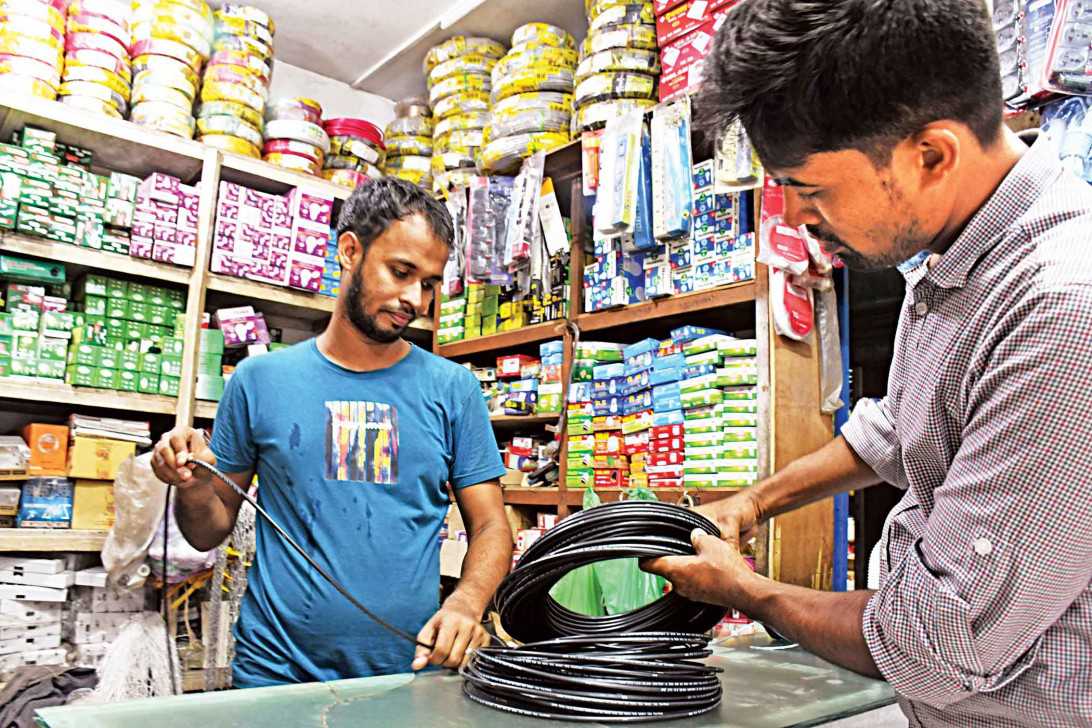96pc small enterprises suffer fall in income: study

Image: Collected
Some 96 percent of Bangladesh's micro, small and medium enterprises (MSMEs) witnessed a fall in income with the median loss in business reaching 82 per cent amid the Covid-19 fallouts, according to a recent study.
Customer footfall decreased 67 per cent on an average for respondents of a survey carried out under the multi-country assessment study on the pandemic's impact on MSMEs and women in Asia and Africa.
The small-scale firms in rural areas are having to travel to central depots to collect supplies due to massive disruptions to supply chains.
Furthermore, some 36 per cent of the entities reported a decline in the availability of supplier credit, with a third of the suppliers not offering in apprehension of non-repayment by end-customers.
Combined with pending receivables, this has hurt cash flows as 58 per cent of the small businesses reported a reduction in household expenses.
With a rise in living costs in urban areas, 68 per cent of the urban enterprises witnessed a fall in household expenses compared to 33 per cent of their rural peers, the report said.
These findings were made public by MicroSave Consulting (MSC) through a workshop it organised on the issue last Thursday with Swiss Capacity Building Facility.
The pandemic was a huge test for financial inclusion and donors, private sectors and governments urgently need to focus on supporting low and moderate-income populations and enterprises and farmers, it added.
With limited net worth and savings to fall back on, coupled with a squeeze on access to finance, these segments have faced severe disruptions in demand and payment cycles. Business continuity has been the greatest hurdle.
It is to not only help them recover, but to also avoid the risk of them falling back in the vicious cycle of poverty and indebtedness, it read.
This sector in Africa and Asia will need a three-pronged approach to kick start recovery. The support needs to come from governments, regulators, financial service providers and private sector players, said the report.
The Kenyan government already reduced an "SME Turnover Tax" from 3 per cent to 1 per cent, increased the eligibility cap from an annual $50,000 to $500,000 and exempted those with annual sales of $5,000.
The Bangladesh government extended the moratorium period to one year on stimulus loans being disbursed.
Recently, Bangladesh Bank also set up a $590 million refinancing fund for three years to provide credit to cottage, micro, and small enterprises, according to a statement.
One of the biggest coping mechanisms was an increase in savings into more formal products like mobile wallets and credit unions and a decrease in credit demand from the masses, said Evelyn Stark, financial health strategy lead of MetLife Foundation.
However, credit demand increased from the MSMEs to restart businesses, she said.
"Some 42 per cent of MSMEs and small businesses are in direct risk of failure in the next 6 months," said Payal Dalal, senior vice president of Social Impact, International Markets, Mastercard Center for Inclusive Growth.
"And irrespective of an economy's level of development, size, geographical location, women have been disproportionately more vulnerable to the economic consequences of this pandemic," she added.
Mike McCaffrey, East and Southern Africa regional manager of United Nations Capital Development Fund, and Mark Napier, CEO of FSD Africa, also spoke at the webinar moderated by Graham AN Wright, group managing director of the MSC.
Source: https://www.thedailystar.net
Tags :
Previous Story
- 96% MSMEs in Bangladesh lost income in Covid-19...
- Evaly brings SME package to deliver products to...
- Cottage Sector, SMEs: Tk 2,700cr fresh stimulus unveiled
- SME Foundation to create business incubation centres
- Bangladesh Bank, BRAC Lender carry workshop on SME...
- More SME research to diversify exports: commerce minister
- Govt formulating mild engineering development policy
- Six repayment trends to consider in 2021